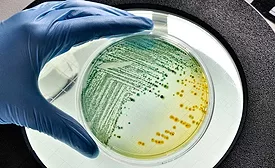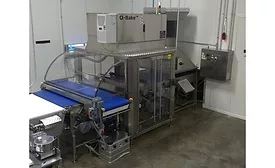Home » Keywords: » food safety
Items Tagged with 'food safety'
ARTICLES
Due to the well-known risks of working with pathogens in an in-plant food laboratory, there has been a dramatic shift to outsourcing for pathogen samples
Read More
Wisconsin dairy groups launch Dairy Food Safety Alliance
The first meeting is set for Oct. 8, 2018.
August 17, 2018
EVENTS
Webinar
2/26/25 to 2/26/26
Contact: Vania Halabou
Transforming Food Safety Through Digitalization and AI—Are You Ready?
Webinar Sponsored Webinars
3/11/25 to 3/10/26
Contact: Vania Halabou
Change Management of Food Safety Culture: Effective Strategies for Achieving Greatness
Webinar
3/31/25 to 3/30/26
Contact: Vania Halabou
Avoid Costly Sanitation Failures with Validation, Verification, and Re-Validation
Webinar
4/24/25 to 4/24/26
Contact: Vania Halabou
How Compliance AI Agents Drive Food Quality and Safety
Webinar
5/1/25 to 5/1/26
Contact: Vania Halabou
Avoiding Sanitation Pitfalls: Challenges and Opportunities for Your Environmental Monitoring Program
Webinar FSS Live Streaming | Available On Demand
5/15/25 to 5/15/26
Contact: Vania Halabou
Alarm Fatigue: How to Ensure Out-of-Compliance Alarms Serve Their Purpose and Ensure Food Safety
Webinar FSS Live Streaming | Available On Demand
5/15/25 to 5/15/26
Contact: Vania Halabou
Town Hall: A Candid Dialogue on the Future of Food Safety
Webinar
6/12/25 to 6/12/26
Contact: Vania Halabou
Additive Bans Ahead: Your Guide to Avoiding Risk and Maintaining Agility
Webinar
6/26/25 to 6/26/26
Contact: Vania Halabou
How to Design and Conduct Challenge Studies for Safer Products and Longer Shelf Life
Webinar
7/22/25 to 7/22/26
Contact: Vania Halabou
Beyond the Binder: Digital Management of Food Safety
Never miss the latest news and trends driving the food safety industry
Newsletters | Website | eMagazine
JOIN TODAY!Copyright ©2026. All Rights Reserved BNP Media.
Design, CMS, Hosting & Web Development :: ePublishing












